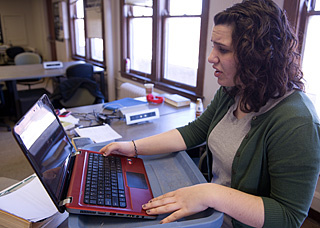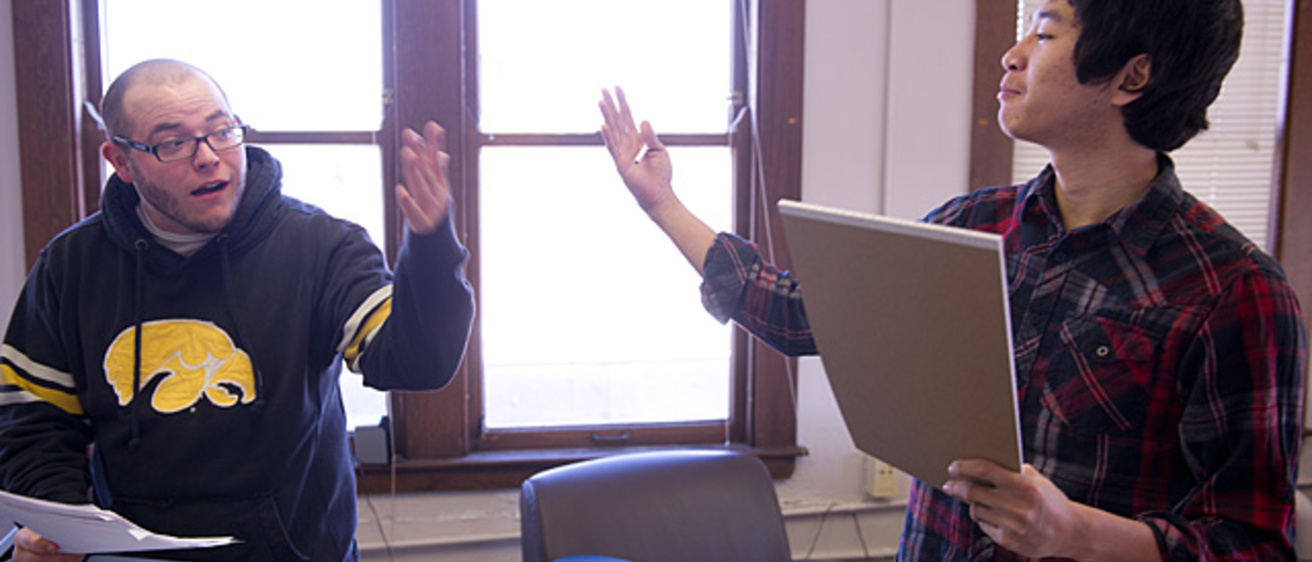Sharon Kann has spent months poring over the details of energy policy—not a typical task for an English major.
“I’m starting to feel like an expert,” says Kann, a University of Iowa junior originally from Cedar Rapids. “I never expected that I’d be able to tell you about the intricacies of the natural gas market in Asia.”
Kann is a member of the UI’s A. Craig Baird Debate Forum, one of the nation’s most accomplished collegiate debate programs. She and teammates have been arguing energy questions from all sides since last fall.
The preparation may pay off this week, when Kann and three other UI students take part in the 2013 National Debate Tournament at Weber State University in Ogden, Utah, March 28-April 1.
Training like athletes
In terms of time and commitment, collegiate debaters are a lot like athletes. They work on their own, practice as teams, even watch “game films.”
“We spent spring break looking at specific teams from different universities,” says Jeffrey Ding, a first-year business student from Iowa City. “We wanted to identify particular challenges we might face and develop strategies to address them.”
2012-13 collegiate debate resolution
“The United States federal government should substantially reduce restriction on and/or substantially increase financial incentives for energy production in the United States of one or more of the following: coal, crude oil, natural gas, nuclear power, solar power, wind power.” —
Debaters compete in two-person teams. Kann’s partner for nationals is Spencer Croat, a junior originally from Indianola. Ding’s partner is Liam Hancock, a first-year economics and political science major from Iowa City.
“Studies that measure collegiate debate preparation equate it to earning a master’s degree every year,” says Paul Bellus, coordinator of forensics for the Office of the Provost, the administrative home for the debate program.
UI debaters are recruited like athletes, too, typically receiving $5,000-10,000 annual scholarships. The Iowa team of 14 students draws top high-school debaters from all over the country.
Top speakers, top students
The UI program has won four national titles since 1997 and produced three National Debate Tournament top speakers—the debate world’s equivalent of the Heisman Trophy.
Today’s program builds on a long and rich history.
“It all started with the Zetagathian Society in 1861, making debate the oldest student activity on campus,” Bellus says. Debates of that era commanded front-page newspaper coverage.
In 1925, A. Craig Baird brought international debate to the UI. He’d founded the field and coached world-class teams for Bates College. At Iowa, he introduced female teams to the all-male debate league and fielded one of the first African American debaters in college competition.
A. Craig Baird championed civil debate as an American institution—and a civic necessity. Read about his work and his legacy in this February 2012 story from the Iowa Alumni Magazine.
“Baird used to say we have a government by and through debate,” Bellus says. “Students in this program become leaders.”
Collegiate competition teams debate a single resolution over the course of a year. Recent topics have addressed immigration, arms reduction, agricultural subsidies, and international relations.
“Many of our alumni go on to public policy roles,” says David Hingstman, associate professor of communication studies and UI director of debate. Almost all pursue post-graduate studies in fields like law, business, political science, and communication studies.
Hingstman and Bellus note that debaters are some of the university’s most accomplished students—the program has had a 100 percent graduation rate for as long as anyone can remember, and routinely includes several Presidential Scholars.
Preparation for work and life
In addition to participating in national competitions, the debate program now named for Baird also hosts a series of public debates before lay audiences on campus. From time to time, the group has been asked to debate proposed local ordinances, helping policymakers explore all sides of an issue.
UI students also work with Urban Debate Leagues in Chicago and Kansas City, which coordinate debate programs at public high schools. Bellus notes that UI alumni lead several Urban Debate Leagues.
Support from alumni and friends is key to the program’s success. Private donations fund scholarships and travel.
Donor generosity helps students succeed in college and prepare for whatever comes next.

“The research skills I’ve picked up have been really helpful in writing papers and synthesizing arguments,” Ding says. “They help me understand multiple sides of an issue and communicate better.”
Kann says debate is perfect preparation for just about any career—and simply understanding the world.
“I love the opportunity to get close to an argument, test ideas, and adapt my approach to certain audiences,” she explains. “In this media-saturated age, it’s important to be able to process information quickly and craft it into something that will persuade people.”
